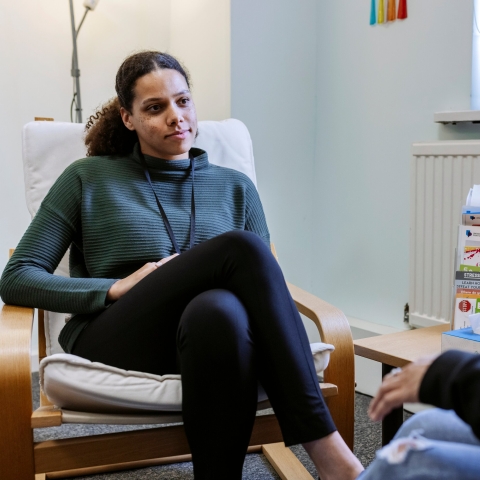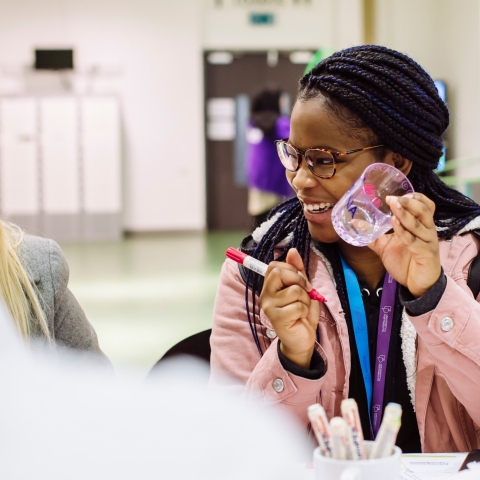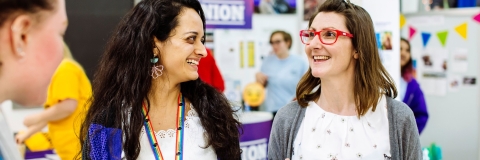
We provide free mental health, wellbeing and counselling support. We work in partnership with you to fulfil your academic potential and have a meaningful university experience.
Our support includes daily advice sessions and counselling, resources and guides for help with different issues, and workshops, courses, events and support groups to connect with others.
We also offer Free 24/7 wellbeing support and practical advice through a confidential helpline - please call 0800 028 3766.
For life threatening emergencies, call 999. Please also see our Urgent Support page.
Below you'll find info on how to get support, and also directions for visiting us.
Looking for Wellbeing services for UoP London?
Get support - speak with a friendly Wellbeing Practitioner
Come in for an in-person appointment, or you can request a video or phone meeting if you prefer. There are two main ways you can get help from us:
Same day wellbeing advice sessions
If you don't know where to start or want to know more about your support options, book one of our 20 minute weekday appointments. These are great for finding out more about:
- Possible solutions to your challenges
- Strategies and techniques to support your wellbeing
- How the Wellbeing Service can help you
Sessions can only be booked on the day. Phone us Mondays to Fridays for an appointment: +44 (0)23 9284 3466.
Appointments are available on a first-come-first-served basis, so we recommend calling us in the morning. You can also email wellbeing-admin@port.ac.uk requesting an advice session.
Register with Student Wellbeing
If you have attended one of our advice sessions previously and are looking for further support, or want to go straight to registering with us instead:
- Click on "Register online" below to complete our secure and confidential form.
- It will take you a minimum of 10-20 minutes and your responses won't be saved until it is all complete, so please make sure you have enough time before you start!
- After you have hit submit - we aim to be in touch by the end of the next working day; so keep checking your emails and keep your phone nearby in case we call you.
- IMPORTANT: If you are in crisis or need urgent support, please see our Urgent Support advice page.
Register online
Need Urgent Support?
Sometimes challenges with your mental health and wellbeing may lead to thoughts of self-harm or suicide and it’s important that you know you are not alone and can access support right now.
Urgent Support
Contacting Student Wellbeing
Call us on +44 (0)23 9284 3466.
Email us on wellbeing-admin@port.ac.uk.
Visiting us in person
If you have an appointment with us, we are on the ground floor of the Bateson Centre, the entrance for which is on Alec Rose Lane.
Our full address is:
The Bateson Centre
Mary Rose St
Portsmouth
PO1 2BL
Our what3words location for our entrance is Fantastic.Leaps.When.
You can also find the entrance on Google Maps.
Student Wellbeing and your privacy

Two ways to get to us
With your back to the Guildhall and the Portsmouth Central Library on the right, face the pedestrian bridge that goes towards Winston Churchill Avenue. Instead of crossing the bridge, go down the flight of the stairs to the left.
At the bottom of the stairs, cross the road and follow it around to the left. Just round the corner, you’ll see a small flight of stairs on the right with a handrail.The entrance to Bateson Centre is at the top of the steps.
Cross at the traffic lights outside the Eldon Building and turn into the pedestrianised route by the Portsmouth Courts. Opposite the entrance to the Court building is a pedestrian pathway, and you’ll see a grey sign for the Bateson Centre.
Follow the arrows up ahead, and you’ll reach the entrance to the building within a few minutes.
Wellbeing resources and other support
You can speak to the NHS, and other organisations and charities specialising in mental health for free, confidential help.
We've also got a range of guides and resources on different topics that can help you navigate mental health at uni, if you'd prefer to read them in your own time.

Support from Student Wellbeing
Want to know about the wellbeing support we offer at the University of Portsmouth? Hear from our Student Wellbeing team.
As a student at the University of Portsmouth, we want you to fulfil your potential and have a life-changing student experience.
The Student Wellbeing Service is the hub for learning, adviceand support for your emotional wellbeing and mental health.
If you are new to university life, then you may be facing a number of life challenges.
Transition from home to a new life, financial independence, new friendships and relationships, living independently, and of course, new academic challenges and expectations.
For all students, when you're facing challenges, it is likely you will find yourself feeling stressed, worried, unhappy or anxious at times.
This does not mean there is something wrong with you. Learning to cope with these challenges constructively provides opportunities for growth and personal development.
The knowledge and tools you will develop are life skills that you can take forward and use long after graduation.
But if you do start to struggle at any point, please do come and see us straight away.
The Student Wellbeing Service is a team of practitioners with a broad range of experience, expertise and skills.
We have mental health advisors, counsellors and wellbeing advisors who offer 1-to-1 support.
You can come in and see us for these or you can book a phone or video call instead.
For more detailed information about everything that we provide and how to access the service, please visit our website.
And remember, if you think you need support, please come and see us.
Wellbeing workshops, events and groups
Get involved in the free wellbeing support available for you at uni, including support groups, drop-in events, workshops and the annual Feel Good Fest.

Concerned about a student?
If you're concerned about a University of Portsmouth student, find out how to let us know. Whether you're a fellow student, a member of staff, a concerned family member, or a medical professional, you can contact Student Services for advice and guidance.

Chaplaincy
Whether you have faith or not, to talk or be still, our space is yours. The Chaplaincy is there to support all students, of any faith or none.

Wellbeing services for London campus students
Use our guidance and support services to brush up your study skills, handle your finances, or manage your health and wellbeing.
Your Student Services Team is here to help, support and signpost you. Contact studentlifelondon@port.ac.uk for any queries, or call us on 020 3814 0700.
Student Health and Wellbeing: London campus
Your health and wellbeing matters to us, and it's important for your learning too. Find out more about the many ways we can help you take care of your mind, body and spirit so that you are set to manage challenges and fulfil your potential.
Get support
You can come in for an appointment with one of our colleagues, or you can request a video or phone meeting if you prefer.
There are two main ways you can get help from us:
Weekday appointments
If you don't know where to start or want to know more about your support options, book one of our 20 minute weekday appointments. These are great for finding out more about:
- Possible solutions to your challenges
- Local services to support your wellbeing
- How the Wellbeing Service can help you
Full support from the Wellbeing Service
Contact us to request more detailed one-to-one help, on studentlifelondon@port.ac.uk. A Mental Health practitioner will contact you to assess your needs.
Support links
Additional Support and Disability service
We support students and applicants who share a disability or require additional support for their academic studies.
We provide a confidential service for all students with additional learning needs, and can give you advice on academic support.
We can also discuss what reasonable adjustments you may require and refer you to appropriate agencies for support.
Contact us, in confidence, if you have a condition that might impact on your ability to access the campus, curriculum, teaching, learning, assessments and any other UoP London service. It’s best to contact us as soon as possible after you accept an offer - our staff can guide you through the whole process. We can offer support on adjustments to your studies, advice on evidence, the Disabled Students' Allowance (DSA), and support with technology and study skills.
Tell us about you
If you need additional support resulting from a disability or specific learning difference, complete our short additional Support Questionnaire on your Student View.
Contact us at UoP London
Juniper House, 221 Hoe Street, Walthamstow, E17 9PH,
Opening hours: Monday-Friday, 9 am to 5 pm
Your Student Services Team is here to help, support and signpost you. Contact studentlifelondon@port.ac.uk for any queries, or call us on 020 3814 0700.
Enable University alerts
Turn on notifications for critical updates like closures, safety alerts, and urgent service disruptions.






